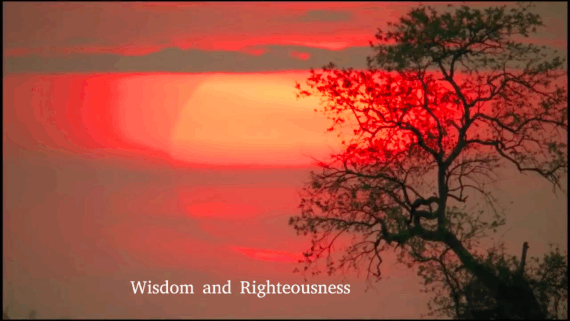In Psalm 111:10, the Psalmist declared: “The fear of the Lord is the beginning of wisdom; all who practice it have a good understanding.” Until we understand who God is and develop a reverential fear of Him, we cannot have true wisdom. True wisdom starts with a deep, respectful awe for God, and not just an intellectual understanding. It involves admiring and esteeming God’s majesty and power. It understands His authority, hates evil, and submits to His will. A foundational appreciation and admiration for God provides a framework for making good decisions and discerning right from wrong, Without the fear of God, human understanding is flawed, and wisdom is impossible.
The fear of the Lord can be defined as the continual awareness that our loving heavenly Father is watching and evaluating everything we think, say, and do. (Matt, 12:36; Ps. 139:2) “The fear of the LORD is the beginning of knowledge.” (Prov. 1:7; 9:10; 14:27; 15:33). It is the basis for walking in His ways, serving Him and loving Him. This verse teaches that the fear of God is foundational to true wisdom, and that true wisdom comes only from understanding who God is. This includes knowing that He is holy, just, and righteous. (Deut. 10:12, 20,21. Some redefine the fear of God to respecting and standing in awe of Him. While respect and awe are definitely included, there is more to it than that. A biblical fear of God understands that God hates sin and fears His judgment of sin, even in the life of a believer. (Heb. 12:5-11).
In Hosea 14:9, the prophet wrote:






Whoever is wise, let him understand these things. Whoever is discerning, let him know them. For the ways of the LORD are right, And the righteous will walk in them, But transgressors will stumble in them.
Hosea’s challenge was that whoever was wise and prudent in Israel in his day would understand that what he was preaching and teaching was true and right. (cf. Deut. 4:3-9). Jehovah’s ways alone are correct, true and right. Those who are righteous and just will walk in them. (Rom. 1:16, 17; 3:21-26)
Prudence means to act according to intelligence, squaring conduct with conviction. One who is wise will comprehend the relationship between Israel’s iniquity and God’s punishment. He will also recognize the mercy and kindness of God in His promise of restoration. God has responded to the sins of his people with mercy and grace. There is an element of discipline in God’s punishment that does not extinguish hope.
We may summarize Hosea’s teachings and make them applicable for today:
(1) Sin separates from God, and blinds us, so that we lose sight of Him;
(2) Idolatry follows inevitably when we fail to see the God who is there.
(3) God is holy and his love is freely given and eternal. But God’s love is never divorced from moral requirement on our part. It is never enough to simply say we believe that Jesus is the Lord. We must demonstrate this belief by doing what God says is right and true. (Matt. 7:21-23) God’s ways are straight and true, and we walk, or fall, according to our relationship with them. A truly wise person understands what has been written and illustrates it by a righteous and godly life. (Matt. 7:24-27)
Some ignored Hosea. They stumbled at what God said…and fell into judgment. Those who rebelled against God were disobedient to his Word and sinned in many different ways. They stumbled at God Himself, at his All-Holy Being, his attributes, his providence, his interference with them, and his requirements. They rebelled against his commandments, which required what they did not like and forbid what they did. They stumbled at his wisdom, and denied God’s right to order His creation according to His own holiness and to punishing sin. Most of all, though, they stumbled at his goodness and disdain for their rebellion and disobedience.
Every attribute, or gift, or revelation of God, which is full of comfort to the believer, is in turn, a potential occasion for stumbling to the rebellious.
This idea is rooted in prophecies from the Old Testament, such as Isaiah 8:14, where the Lord declares He will be a “stone of stumbling and a rock of falling” to the houses of Israel. The Apostle Peter quotes and applies this prophecy to Jesus in 1 Peter 2:8. referring to Christ as a source of stumbling and judgment for those who reject him or his teachings. It highlights the fact that embracing him leads to salvation and rejection leads to ruin. (Matt. 7:13, 14) For true believers, Jesus is the “cornerstone” and the “rock of salvation” upon which they build their lives. For those who are disobedient or reject him, Jesus is a “stumbling stone,” upon whom they fall and are “broken to pieces”.
With this verse, the prophet sums up all the teaching of the seventy years of his ministry. It encapsulates what he has proclaimed about the severity and mercy of God, and about the Coming of Christ, and our resurrection in Him. Today, we are living in a fuller light than Hosea had. We see God as Hosea never saw Him. We see Him in Jesus Christ. We know, as never before, that He cannot compromise with sin. And in order to rescue us from sin, he has supplied the only sacrifice capable of saving us…His own Son. This is what makes our choice so critical and final. It leads either to eternal life or eternal death. Deuteronomy 30:19, states, “I call heaven and earth to witness against you today, that I have set before you life and death, blessing and curse. Therefore, choose life, so that you and your descendants may live”. (cf. Josh. 24:14, 15) This verse, a command from God through Moses, presents a stark choice between obedience (life) and disobedience (death), urging listeners to choose the path that leads to blessing and prosperity.
Manitoulin Island

